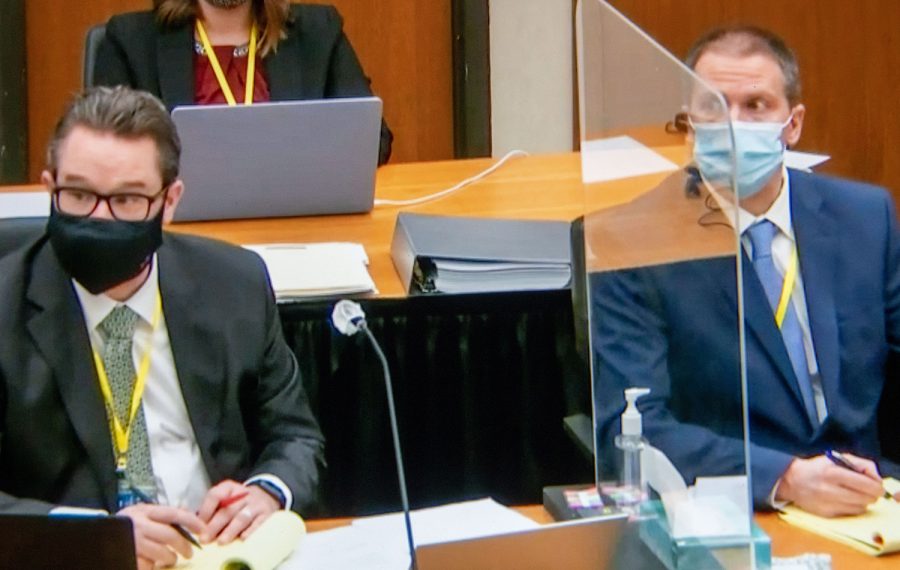Opinion | Iowa politics need to address racial justice and police brutality
Although the Derek Chauvin trial upheld accountability, Iowa has still has a long way to go to when it comes to ending systemic racism.
Minneapolis Defense Attorney Eric Nelson, and former Minneapolis police officer Derek Chauvin, listening to a witness during Chauvin’s trial on April 5, 2021 in Minneapolis.
April 28, 2021
While the result of the Derek Chauvin trial was an example of accountability in our policing system, America still has a long way to go when it comes to racial justice. For Iowa, we still have to make that commitment to systemic change.
After 10 hours of deliberation, the former Minneapolis police officer was found guilty of second-degree murder, third-degree murder, and second-degree manslaughter.
In the aftermath of the Derek Chauvin trial, conversations about the results of this trial and its impact have sparked across the nation. But the real question is where do we — specifically the state of Iowa — go in addressing issues of systemic racism?
After the trial, multiple Iowa leaders and politicians issued statements on the implications of the trial.
Democratic politicians such as Ross Wilburn, chairman of the Iowa Democratic Party and a state legislator, emphasized continuing to uplift Black voices and defending Black lives in Iowa who are victims of police brutality.
Matt Sinovic, executive director of Progress Iowa, said he while hoped the trial brought some peace to George Floyd’s family, we must continue to fight to change state and federal law that doesn’t hold accountability for our police system.
On the Republican side, Iowa Gov. Kim Reynolds said in a press conference that the trial “shows that our legal system worked…and it’s time that we all come together as a country, heal, and continue to move forward.”
Iowa Sen. Julian Garrett, R-Indianola, said that he believes that the majority of police officers are good people and that this situation was what he called “ a rogue cop who did something he shouldn’t have done and the system worked and he was held accountable for it”, according to an article from the *Quad-City Times*.
So, what’s the problem with these statements? Well, what does exactly moving forward look like in Reynolds’ eyes?
It’s time to stop putting a Band-Aid on an old wound, which means moving forward and healing must include enacting systemic change. But frankly, legislation and some of Iowa politicians’ actions are going to prevent any progress in eliminating systemic racism in Iowa.
Even after Chauvin was found guilty, some of our leaders failed to recognize we still have a problem when it comes to systemic racism and police brutality. From marijuana arrest disparities to the tear-gassing incident on the I-80 last summer, it’s clear that Iowa has flaws in the system.
To be fair, Iowa did take some initiative when Reynolds signed a bill last summer that included banning most chokeholds and addressing police misconduct. But one piece of legislation only fixed a small part of the broken system, and Iowa is refusing to fix the rest of the cracks.
Take, for example, the fact that the anti-racial profiling bill failed to advance during this year’s legislative session. However, pro-police bills are still alive, such as the ‘Back the Blue’ bill that increases penalties on protest activity and reduces state funding for local governments that don’t follow these laws.
If we can’t have legislation that addresses these issues, let alone recognize we have a flawed system, then Iowa is going to continue to uphold systemic racism.
Chauvin’s trial was a step in the right direction when it comes to racial justice, but it doesn’t change the fact the system is still broken. Police brutality is still among us — take for example the death of Daunte Wright — and if anything, it serves as a catalyst to continue the fight against systemic racism. Iowa is part of the problem, and this trial is pushing the state to commit to racial justice and create legislation that enacts systemic change.
Columns reflect the opinions of the authors and are not necessarily those of the Editorial Board, The Daily Iowan, or other organizations in which the author may be involved.















